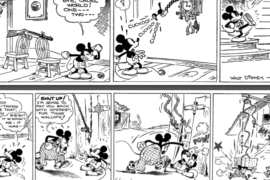Articles/Essays – Volume 46, No. 2
What if Mickey Mouse Isn’t Mormon? | Floyd Gottfredson, Walt Disney’s Mickey Mouse: “Race to Death Valley”
Editor’s Note: This article has footnotes. To review them, please see the PDF below.
The 2010 videogame Epic Mickey, before its release, was looking to be one of the more controversial games of the year. And that’s without any sex or decapitation. What made it so controversial? Because its Mickey was a bit more adventurous and scrappy and dangerous than the carefully controlled Mickey Mouse that developed in the animated cartoons. But that Mickey was never the only Mickey—or even the original Mickey.
Floyd Gottfredson was a Mormon kid born in Utah who started selling cartoons to local papers before moving to Los Angeles and getting a job with the Disney Studio. Though hired as an inbetweener, he soon found himself assigned to the new Mickey Mouse newspaper strip. The creative director of Epic Mickey writes that Gottfredson’s “strips feel like what Walt [Disney] and Ub [Iwerks, Mickey’s creators] would have done if they’d pioneered a medium of still images rather than one of images in motion, a medium where readers would return reliably, for weeks, even months on end.”
It was Gottfredson’s Mickey that could inspire those looking to recreate the character for a videogame-playing generation. When I first approached Dialogue about reviewing the first volume of Fantagraphics’s beautiful new series of books collecting all the Gottfredson strips from April 1, 1930 to November 19, 1976, it was with the intention of bringing a hearty Mormon reading to his comics work. I figured that the first story (which provides the book’s title), “Race to Death Valley,” would surrender all sorts of pioneery motifs easily applicable to Mormon Experience.
In fact, the book surrendered nothing of the kind.
Now, it may be that later volumes covering later years, in which Gottfredson’s autonomy grew, may prove more amenable to saintly readings, but this volume did not. In fact, I realized a certain sense of irony when the editorial comments engaged in embarrassing PC readings similar to what I had intended. Example: in the introduction to “Mickey Mouse and the Ransom Plot” (July 20, 1931 to November 7, 1931) the editors feel a need to apologize for the story “as a relic of its time,” making Gypsies into Gypsy stereotypes, and reading into the narrative a “Gottfredson [who] doesn’t seem to have been truly comfortable with the melo dramatic tropes he was invoking.”
Seeing another modern reader twisting the text into something closer to their own worldview repented me of my own desire to do the same. And I decided to just read the strips as a serial comedy-adventure and judge them on that basis.
Unfortunately, I don’t think the strips have aged that well. Gottfredson fans insist that the first few years (as covered in this volume) are not his best work, but I’m not sure I’m even intrigued enough to give Mickey another shot. I don’t, in other words, want to drop the money to purchase them myself now that I am no longer likely to receive free review copies in the mail.
However, I must remember that I am an adult, jaded and picky and well-read in modern comics. So, although Gottfredson’s early Mickey Mouse strips did not win my love, I do recognize his skill and potential, and I look forward to passing the book on to my kids and hearing them laugh their heads off in the back of the car at jokes I could only roll my eyes at, hearing them chatter about thrills and plot twists I found tedious.
And maybe, just maybe, if they love it enough, I’ll feel obliged to buy volume two, Walt Disney’s Mickey Mouse: “Trapped on Treasure Island,” which came out in October.
And maybe, if I’m lucky, Treasure Island will be a clear metaphor for Adam-ondi-Ahman.
Floyd Gottfredson. Walt Disney’s Mickey Mouse: “Race to Death Valley.” Seattle: Fantagraphics Books, 2011. 286 pp. Introductory and supplementary materials by Warren Spector, Thomas Andrae, Floyd Norman, David Gerstein, Giorgio Scudellari, Alberto Becattini, Frank Behmak, Mortimer Franklin, R. M. Finch, Ub Iwerks, Win Smith and Floyd Gottfredson. Hardcover: $29.99. ISBN 978– 1–60699–441–2.


 Back to full Issue
Back to full Issue

